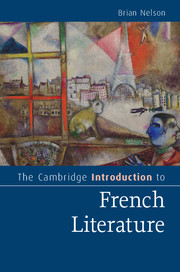Book contents
- Frontmatter
- Dedication
- Contents
- Preface
- Acknowledgements
- Chronology
- 1 Villon: a dying man
- 2 Rabelais: the uses of laughter
- 3 Montaigne: self-portrait
- 4 Corneille: heroes and kings
- 5 Racine: in the labyrinth
- 6 Molière: new forms of comedy
- 7 La Fontaine: the power of fables/fables of power
- 8 Madame de Lafayette: the birth of the modern novel
- 9 Voltaire: the case for tolerance
- 10 Rousseau: man of feeling
- 11 Diderot: the enlightened sceptic
- 12 Laclos: dangerous liaisons
- 13 Stendhal: the pursuit of happiness
- 14 Balzac: ‘All is true’
- 15 Hugo: the divine stenographer
- 16 Baudelaire: the streets of Paris
- 17 Flaubert: the narrator vanishes
- 18 Zola: the poetry of the real
- 19 Huysmans: against nature
- 20 Mallarmé: the magic of words
- 21 Rimbaud: somebody else
- 22 Proust: the self, time and art
- 23 Jarry: the art of provocation
- 24 Apollinaire: impresario of the new
- 25 Breton … Company: Surrealism
- 26 Céline: night journey
- 27 Sartre: writing in the world
- 28 Camus: a moral voice
- 29 Beckett: filling the silence
- 30 French literature into the twenty-first century
- Notes
- Further reading
- Index of authors and titles
- Index of genres, movements and concepts
- Cambridge Introductions to …
- References
18 - Zola: the poetry of the real
Published online by Cambridge University Press: 05 July 2015
- Frontmatter
- Dedication
- Contents
- Preface
- Acknowledgements
- Chronology
- 1 Villon: a dying man
- 2 Rabelais: the uses of laughter
- 3 Montaigne: self-portrait
- 4 Corneille: heroes and kings
- 5 Racine: in the labyrinth
- 6 Molière: new forms of comedy
- 7 La Fontaine: the power of fables/fables of power
- 8 Madame de Lafayette: the birth of the modern novel
- 9 Voltaire: the case for tolerance
- 10 Rousseau: man of feeling
- 11 Diderot: the enlightened sceptic
- 12 Laclos: dangerous liaisons
- 13 Stendhal: the pursuit of happiness
- 14 Balzac: ‘All is true’
- 15 Hugo: the divine stenographer
- 16 Baudelaire: the streets of Paris
- 17 Flaubert: the narrator vanishes
- 18 Zola: the poetry of the real
- 19 Huysmans: against nature
- 20 Mallarmé: the magic of words
- 21 Rimbaud: somebody else
- 22 Proust: the self, time and art
- 23 Jarry: the art of provocation
- 24 Apollinaire: impresario of the new
- 25 Breton … Company: Surrealism
- 26 Céline: night journey
- 27 Sartre: writing in the world
- 28 Camus: a moral voice
- 29 Beckett: filling the silence
- 30 French literature into the twenty-first century
- Notes
- Further reading
- Index of authors and titles
- Index of genres, movements and concepts
- Cambridge Introductions to …
- References
Summary
I have an obsession with authentic detail; the springboard of precise observation makes possible the leap into the stars.
– Zola, Letter to Henry Céard, 22 March 1885Unlike Flaubert, the ‘hermit of Croisset’, who turned away from his age in an attitude of ironic detachment, Émile Zola (1840–1902) embraced his century in away no French writer had done since Balzac. Zola's ambition was to emulate Balzac by writing a comprehensive history of contemporary society. His main achievement was his twenty-volume novel cycle, Les Rougon-Macquart, published between 1871 and 1893. The fortunes of a family, the Rougon-Macquart, are followed over several decades. The various family members spread throughout all levels of society, and through their lives Zola examines methodically the social, sexual and moral landscape of the late nineteenth century. Zola is the quintessential novelist of modernity, understood as a time of tumultuous change. The motor of change was the rapid expansion of capitalism, with all that that entailed in terms of the altered shapes of the city, new forms of social practice and economic organization, and heightened political pressures. Zola was fascinated by change, and specifically by the emergence of a new, mass society.
Zola rejected much of the social and moral content of the bourgeois worldview, but he retained the central epistemological tenet on which it was based: ‘scientific’ objectivity. Converted from a youthful romantic idealism to realism in art and literature, he began promoting a scientific view of literature inspired by the aims and methods of experimental medicine. He called this new form of realism ‘naturalism’. The subtitle of the Rougon-Macquart cycle, ‘A Natural and Social History of a Family under the Second Empire’, suggests Zola's two interconnected aims: to use fiction to demonstrate a number of ‘scientific’ notions about the ways in which human behaviour is determined by heredity and environment; and to use the symbolic possibilities of a family whose heredity is tainted to represent a diseased society – the corrupt yet dynamic France of the Second Empire (1852–70).
- Type
- Chapter
- Information
- The Cambridge Introduction to French Literature , pp. 132 - 140Publisher: Cambridge University PressPrint publication year: 2015

